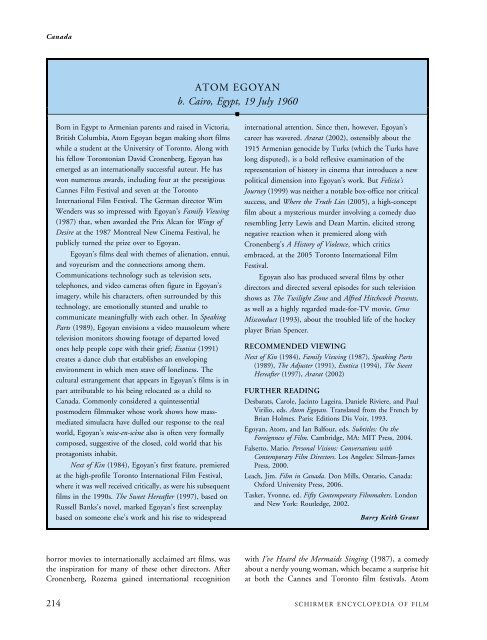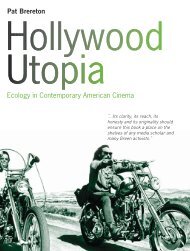Schirmer Encyclopedia of Film
Schirmer Encyclopedia of Film
Schirmer Encyclopedia of Film
You also want an ePaper? Increase the reach of your titles
YUMPU automatically turns print PDFs into web optimized ePapers that Google loves.
Canada<br />
Born in Egypt to Armenian parents and raised in Victoria,<br />
British Columbia, Atom Egoyan began making short films<br />
while a student at the University <strong>of</strong> Toronto. Along with<br />
his fellow Torontonian David Cronenberg, Egoyan has<br />
emerged as an internationally successful auteur. He has<br />
won numerous awards, including four at the prestigious<br />
Cannes <strong>Film</strong> Festival and seven at the Toronto<br />
International <strong>Film</strong> Festival. The German director Wim<br />
Wenders was so impressed with Egoyan’s Family Viewing<br />
(1987) that, when awarded the Prix Alcan for Wings <strong>of</strong><br />
Desire at the 1987 Montreal New Cinema Festival, he<br />
publicly turned the prize over to Egoyan.<br />
Egoyan’s films deal with themes <strong>of</strong> alienation, ennui,<br />
and voyeurism and the connections among them.<br />
Communications technology such as television sets,<br />
telephones, and video cameras <strong>of</strong>ten figure in Egoyan’s<br />
imagery, while his characters, <strong>of</strong>ten surrounded by this<br />
technology, are emotionally stunted and unable to<br />
communicate meaningfully with each other. In Speaking<br />
Parts (1989), Egoyan envisions a video mausoleum where<br />
television monitors showing footage <strong>of</strong> departed loved<br />
ones help people cope with their grief; Exotica (1991)<br />
creates a dance club that establishes an enveloping<br />
environment in which men stave <strong>of</strong>f loneliness. The<br />
cultural estrangement that appears in Egoyan’s films is in<br />
part attributable to his being relocated as a child to<br />
Canada. Commonly considered a quintessential<br />
postmodern filmmaker whose work shows how massmediated<br />
simulacra have dulled our response to the real<br />
world, Egoyan’s mise-en-scène also is <strong>of</strong>ten very formally<br />
composed, suggestive <strong>of</strong> the closed, cold world that his<br />
protagonists inhabit.<br />
Next <strong>of</strong> Kin (1984), Egoyan’s first feature, premiered<br />
at the high-pr<strong>of</strong>ile Toronto International <strong>Film</strong> Festival,<br />
where it was well received critically, as were his subsequent<br />
films in the 1990s. The Sweet Hereafter (1997), based on<br />
Russell Banks’s novel, marked Egoyan’s first screenplay<br />
based on someone else’s work and his rise to widespread<br />
horror movies to internationally acclaimed art films, was<br />
the inspiration for many <strong>of</strong> these other directors. After<br />
Cronenberg, Rozema gained international recognition<br />
ATOM EGOYAN<br />
b. Cairo, Egypt, 19 July 1960<br />
international attention. Since then, however, Egoyan’s<br />
career has wavered. Ararat (2002), ostensibly about the<br />
1915 Armenian genocide by Turks (which the Turks have<br />
long disputed), is a bold reflexive examination <strong>of</strong> the<br />
representation <strong>of</strong> history in cinema that introduces a new<br />
political dimension into Egoyan’s work. But Felicia’s<br />
Journey (1999) was neither a notable box-<strong>of</strong>fice nor critical<br />
success, and Where the Truth Lies (2005), a high-concept<br />
film about a mysterious murder involving a comedy duo<br />
resembling Jerry Lewis and Dean Martin, elicited strong<br />
negative reaction when it premiered along with<br />
Cronenberg’s A History <strong>of</strong> Violence, which critics<br />
embraced, at the 2005 Toronto International <strong>Film</strong><br />
Festival.<br />
Egoyan also has produced several films by other<br />
directors and directed several episodes for such television<br />
shows as The Twilight Zone and Alfred Hitchcock Presents,<br />
as well as a highly regarded made-for-TV movie, Gross<br />
Misconduct (1993), about the troubled life <strong>of</strong> the hockey<br />
player Brian Spencer.<br />
RECOMMENDED VIEWING<br />
Next <strong>of</strong> Kin (1984), Family Viewing (1987), Speaking Parts<br />
(1989), The Adjuster (1991), Exotica (1994), The Sweet<br />
Hereafter (1997), Ararat (2002)<br />
FURTHER READING<br />
Desbarats, Carole, Jacinto Lageira, Daniele Riviere, and Paul<br />
Virilio, eds. Atom Egoyan. Translated from the French by<br />
Brian Holmes. Paris: Editions Dis Voir, 1993.<br />
Egoyan, Atom, and Ian Balfour, eds. Subtitles: On the<br />
Foreignness <strong>of</strong> <strong>Film</strong>. Cambridge, MA: MIT Press, 2004.<br />
Falsetto, Mario. Personal Visions: Conversations with<br />
Contemporary <strong>Film</strong> Directors. Los Angeles: Silman-James<br />
Press, 2000.<br />
Leach, Jim. <strong>Film</strong> in Canada. Don Mills, Ontario, Canada:<br />
Oxford University Press, 2006.<br />
Tasker, Yvonne, ed. Fifty Contemporary <strong>Film</strong>makers. London<br />
and New York: Routledge, 2002.<br />
Barry Keith Grant<br />
with I’ve Heard the Mermaids Singing (1987), a comedy<br />
about a nerdy young woman, which became a surprise hit<br />
at both the Cannes and Toronto film festivals. Atom<br />
214 SCHIRMER ENCYCLOPEDIA OF FILM
















